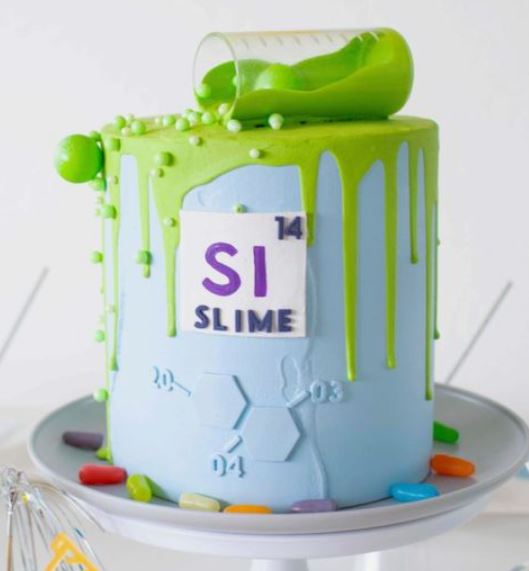Online ‘Diatribe’ Over a Birthday Cake Isn’t Protected by Anti-SLAPP Law–Woodhill Ventures v. Yang
The court opinion starts: “This case is about a birthday cake.” Ben “Baller” Yang, blinger to some stars, and his wife threw a birthday party for their 7 year old child, London (is this London’s Instagram page?). The wife ordered a cake from “Big Sugar,” an LA bakery. The parties dispute whether the bakery was told that London was turning 7. The wife sent this reference photo to the bakery:
Note that the cake displays some colorful commercially available candies (maybe Mike & Ike’s?) as metaphorical pills. The bakery prepared this cake (the court included this photo in its opinion–yay!):
The custom cake upset Baller because he felt that, unlike the reference photo, the pills at the cake’s bottom were realistic, and this suggested to kids that pharmaceutical drugs are like candy. Baller communicated his displeasure to the cake shop. The parties disagree about what happened in those conversations, but Baller came away even more unhappy. He then went on an online diatribe against Big Sugar. At Instagram, where he has 1.5M followers, he posted (among other things):
- “WE GONNA MAKE @BIGSUGARBAKESHOP FEEL IT”;
- “Welp @bigsugarbakeshop you fucked up royally and now you guys are legit canceled. And you fucked up my sons [sic] bday cake. So I’ll make sure nobody I know or who knows me ever does business with idiots such as your business”;
- “Anyone in their even high mind would know that you should NEVER EVER PUT DRUGS ON A 7 year old kids [sic] bday cake!”
At Twitter, where Baller has 300k+ followers, he posted (among other things):
- “This place called @BigSugarBakeshp [sic] in studio city CA super fucked up on my sons [sic] bday cake. Instead of jelly beans they put RX prescription pills on my 7 year olds [sic] bday cake.”
- “If they offered it and was [sic] apologetic about it. We would [sic] even be here bruh. Instead they threw the blame on my wife and hung up on me and acted like bitches.”
Baller’s followers predictably took the bait and cybermobbed the bakery: “Big Sugar began receiving calls from Yang’s followers, upset that Big Sugar had put prescription pills on a child’s cake. Callers threatened to ‘fuck up’ the employees, said the employees should be killed, and claimed to have called the police and health department about Big Sugar’s conduct.” We’ve seen the same story play out hundreds of times over the last quarter-century (the facts in Zeran v. AOL follow a similar pattern)–it’s never OK to issue random threats of violence, especially in response to an unverified online posting. When we will ever mature as a society?
The bakery sued Baller for defamation and unfair competition. Baller filed an anti-SLAPP motion to strike. The appeals court holds that this isn’t a SLAPP and therefore the lawsuit may proceed.
The parties agree that Baller made his statements in public fora. They disagree about whether his statements involved an issue of public interest. Baller supported his position with the following arguments:
- his remarks related to the public health issue of kids mistaking pharmaceuticals for candy. The court replies: “Yang’s statements did not seek public discussion of anything. They aimed to whip up a crowd for vengeful retribution.”
- both Baller and Big Sugar are in the public eye. The court is not impressed with Baller’s self-perceived celebrity status or his 1.5M Instagram followers: “Yang incorrectly suggests his celebrity status means everything he says is of public interest. This is not so. Even people of great renown are capable of banalities, as are we all. Nor can Yang rely on the fact he published his statements to many people. Shouting makes the volume loud. It does not make the content worthy.” As for Big Sugar, “Despite its name, Big Sugar is a small business. It has two shops in Los Angeles. That is all.”
- his posts provide consumer information. Consumer reviews are a paradigmatic type of content that anti-SLAPP laws should protect, and the court agrees that “consumer protection information” can qualify. However, not all of it is an issue of public interest. For more on this point, see my decade-old blog post. The court says: “Yang’s quest for revenge did not give consumers information beyond his complaints about his one cake order. Consumers are interested in the reactions of other consumers, but a single report is the classic small sample, subject to the classic small sample error….Yang’s postings were not a discussion of anything. They were only a diatribe. But ‘an attempt to exact a personal revenge’ by causing others to ostracize the target is not a protected public interest statement.” Characterizing Chaker v. Mateo as an outlier, the court says: “To the extent Chaker can be read to protect any review of a person or business, we respectfully disagree.”
The court concludes the opinion:
Yang is complaining about a cake order. He did not like the cake and he did not like the service. Those are not issues of public interest.
For writing a withering first sentence, for dunking on the Baller, and for including cake photos in the opinion, I am giving the Technology & Marketing Law Blog “Judge of the Day” award to Judge John Shepard Wiley Jr. Note that Judge Wiley appeared on the blog earlier this year in an opinion I liked less.
Case citation: Woodhill Ventures LLC v. Yang, 2021 WL 4025544 (Cal. App. Ct. Sept. 3, 2021)


